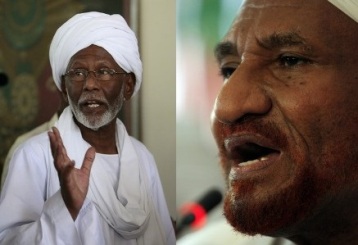Turabi’s party reveals ongoing contacts to secure al-Mahdi’s return Sudan
July 27, 2015 (KHARTOUM) – Sudan’s Popular Congress Party (PCP) led by Hassan al-Turabi has disclosed ongoing contacts with the exiled leader of the opposition National Umma Party (NUP) al-Sadiq al-Mahdi to convince him to return to the country.

Since then he has remained abroad based in the Egyptian capital of Cairo. The Sudanese president vowed to arrest him after the signing of Paris Declaration with the Sudanese rebel groups in Paris on 8 August 2014.
PCP political secretary, Kamal Omer, said in a press conference on Monday that his party and the ruling National Congress Party (NCP) are making contacts with al-Mahdi but didn’t reveal the outcome of those contacts.
He stressed that the PCP objects to any criminal proceedings that might be taken against al-Mahdi, saying they emphasize the latter’s right to enter and exit the country at any time.
Omer reiterated his party’s commitment to the national dialogue, underscoring they wouldn’t abandon it because other forces are refusing to engage in the process.
On 15 July, the chairman of the Just Peace Forum (JPF), al-Tayeb Mustafa, said he discussed with the presidential assistant, Ibrahim Mahmoud, the return of al-Mahdi, from his voluntary exile.
The PCP official criticized the opposition National Consensus Forces (NCF) for setting 14 prerequisites to join the national dialogue, saying the position of the armed groups toward the dialogue is much better than the stance of the alliance of left parties.
The Sudanese president Omer Hassan al-Bashir launched the national dialogue initiative in January 2014 in which he urged opposition parties and rebels alike to join the dialogue table to discuss all the pressing issues related to peace and constitutional reforms.
But the initiative faced serious setbacks after the government refusal to create suitable atmosphere by releasing political prisoners, ensuring freedoms, and postponement of elections.
The NUP, which was part of the internal process, withdrew from the process in protest of al-Mahdi’s arrest in May 2014.
The PCP was among the first political forces to approve al-Bashir’s call for the national dialogue. Also, the lslamist party is the only significant political force that didn’t suspend its participation in the process.
DIALOGUE POSTPONEMENT
Meanwhile, Omer said the dialogue higher coordination committee would decide in its upcoming meeting on the commencement of the dialogue, expecting that a compromise solution would be reached between those who call for the postponement of the process and those who support its immediate start.
Last week, the member of Sudan’s dialogue coordination body Aboud Jaber said they intend to ask president al-Bashir to delay the start of the process until October to allow the dialogue committees to make more preparations.
But the PCP was quick to reject the proposition to delay the national dialogue saying they can no longer accept a new postponement.
UNITY OF THE ISLAMISTS
The PCP official said that the unity of the Islamists wouldn’t be achieved at the expense of other political forces, underscoring the unity of the country has priority over the unity of the Islamic forces.
He pointed out that his party supports all political parties which seek to achieve democracy and call for the unity of the national forces, urging the NUP, the Democratic Unionist Party (DUP) and the left parties to support the call for unity.
“We don’t want to forge an Islamic alliance in the face of a secular alliance or vice-versa,” he added.
Earlier this month, PCP leader Hassan al-Turabi said he was confident of the reunification of Sudanese Islamists and expressed hope to achieve it within a year.
Since the coup d’etat they organized in June 1989, the Sudanese Islamists splinted into different factions. After his removal from the party in December 1999; Turabi established the PCP.
The peace agreement of 2005, which paved the way for the South Sudan independence, deepened divisions among the Sudanese Islamists. The former Mujahidin distanced themselves. Also, others led by al-Tayeb Mustafa created the radical JPF.
(ST)
